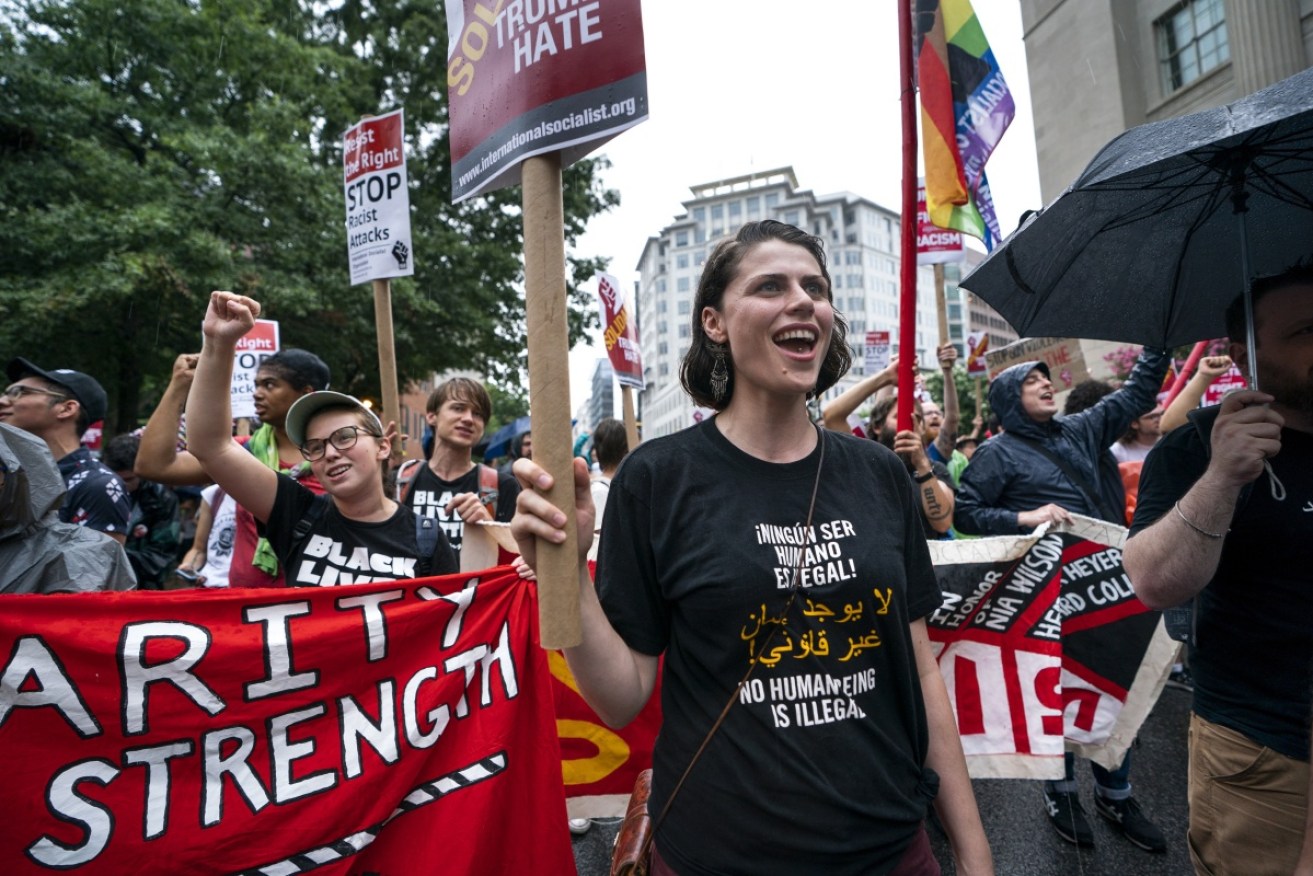New Zealand PM Jacinda Ardern backs Facebook ban on white nationalism


The anti-racism protesters vastly outnumbered the white supremacists. Photo: EPA
New Zealand Prime Minister Jacinda Ardern has welcomed a decision by Facebook to ban white nationalist content after the social media giant finally reacted to fierce public criticism over its handling of extremism after the Christchurch mosques massacre.
The move means views promoted by the likes of controversial Senator Fraser Anning would be flagged and removed by Facebook and Instagram, with the platforms confirming politicians would be monitored in the tightening of “hate speech” rules.
Racists would also be unable to use the platforms to organise events and rallies.
The spotlight has turned on the internet’s handling of white supremacy and nationalism after Australian Brenton Tarrant allegedly shot dead 50 Muslims who had gathered for Friday prayers in two Christchurch mosques.
Tarrant live-streamed his horrendous killing spree on Facebook, and the footage was then redistributed on other sites.
In the days after the attack, Senator Anning, who has more than 110,000 Facebook ‘likes’ was widely condemned for linking the terror attack to Muslim immigration.
The upper house is expected to censure Senator Anning when Parliament reconvenes on Monday.
There have also been calls since the Christchurch attack for tighter regulation of the mainstream media, with critics pointing to the example of ABC, Seven and Sky giving airtime to right-wing extremist Blair Cottrell.
Facebook revealed on Thursday it was taking a harder line against hate speech by banning any support, praise and representation of white nationalism and white separatism on its two major networks.
“In the case of Senator Anning, we will remove content if it violates our policy,” a Facebook Australia spokesman told AAP.
“But we need to be mindful that (politicians) are in Parliament and … they have a right to political speech as part of that policy framework.”

Independent Senator Fraser Anning has been condemned for his comments after Christchurch, and associations with right-wing extremists. Photo: AAP
Facebook has long banned white supremacy and other hateful treatment of people based on race and religion, but it hasn’t applied the same rationale to white nationalism.
“We don’t tolerate hate and if you’re on our platform to spread hate, we won’t allow it,” Facebook content policy manager Ulrich Casseus told AAP from Washington DC.
“We were initially thinking about broader concepts of nationalism and separatism, such as American nationalism, Irish nationalism and Basque separatism.
“But in speaking with many people in the civil rights arena, we were urged to reconsider our stance.”‘
Mr Casseus suggested the company’s response to politicians may be guided by Parliament, pointing to an almost-unanimous motion in the US Congress in January that rebuked a member for his support of white nationalism.
“While there is disagreement about any hot button issue, we feel that we are in the right place,” he said.
“Regardless if you are a politician, we apply our policy consistently across the globe so that no matter who you are, or where you are, we strive for consistent enforcement.”
In New Zealand, Ms Ardern welcomed the “clarification”.
“Arguably these categories should always fall within the community guidelines of hate speech, but nevertheless it’s positive the clarification has now been made in the wake of the attack in Christchurch,” she said.

Brenton Tarrant is due to appear again in court on April 5. Photo: AAP
Australian Catholic University’s Institute for Religion, Politics and Society senior research fellow Joshua Roose says the new policy will “shut down the shopfront” for those broadcasting white nationalist views.
But Facebook will have a hard task stopping memes, emerging trends and widely used symbols hijacked by white nationalists.
“Basically, (the ban will stop) people walking in the front door and then immediately engaging with a whole community of like-minded far-right extremists,” he told AAP.
“But no doubt they’ll pop up elsewhere … and they will migrate to other platforms.”
Australian experts weren’t involved in the initial conversations about what content to ban but local experts will be meeting Facebook officials this week.
“Local knowledge matters and there is a variety of expertise that needs to be drawn on,” said Andre Oboler, chief executive of the Melbourne-based Online Hate Prevention Institute.
-with AAP








